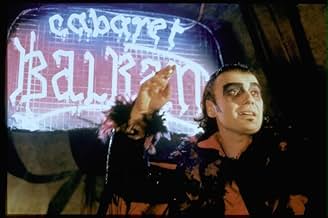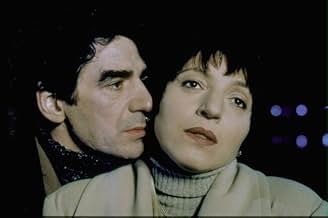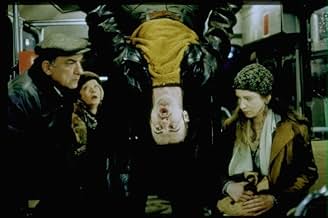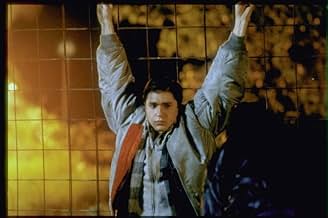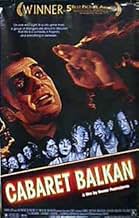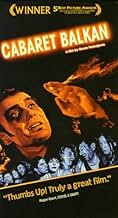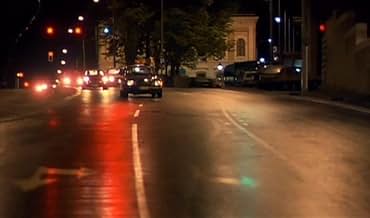AVALIAÇÃO DA IMDb
7,7/10
5,8 mil
SUA AVALIAÇÃO
Adicionar um enredo no seu idiomaRandom Belgrade citizens interact with each other in a night full of crime, frustration, betrayal and revenge.Random Belgrade citizens interact with each other in a night full of crime, frustration, betrayal and revenge.Random Belgrade citizens interact with each other in a night full of crime, frustration, betrayal and revenge.
- Prêmios
- 8 vitórias e 4 indicações no total
Vojislav 'Voja' Brajovic
- Topi
- (as Vojislav Brajovic)
Predrag 'Miki' Manojlovic
- Mane
- (as Predrag-Miki Manojlovic)
Avaliação em destaque
If you know at least something about the events that took place in former Yugoslavia during the 1990s, you should be able to understand this movie.
Many people have misinterpreted this movie as a vicious depictment of some sick Serbian mentality or an exaggerated vision of a post-war Serbia. None of this is true. The theme of "Cabaret Balkan" is not violence. A great parallel can be made between "Cabaret Balkan" and "A Clockwork Orange". The violence in both movies is not the theme - it's merely an extreme way of proving an important point.
The oppressors and the oppressed. The small fish and the big fish. The dogs and the sheep (rock fans might find interesting similarities between this movie and Pink Floyd's "Animals"). There seems to be certain hierarchy present in "Cabaret Balkan". The passive majority is constantly oppressed by the violent minority, many of whom themselves are victims of "bigger fish". The passive majority is always ready to turn a blind eye, to look the other way or, as a scene from the movie so visually illustrates, sit on a different side of the bus.
Who should the war be blamed on? Is it the government's fault? Or is the fault of the people who elected the government? Should the criminals in power take the blame or the people who let them stay in power? A key scene of the movie which takes place in the bus seems to tell us the most about this issue. "You finally stood up to me", says the young bully to the old man who refuses to play along and answer his insulting questions. In a way, the young bully on the bus is the only real hero of "Cabaret Balkan". He is the only one with the guts to stand up for his rights - everyone else would much rather look the other way, ignore the situation and mind their own business.
The original title of the movie - "Powder Keg", draws its name from an old nickname the Balkan peninsula earned at the beginning of this century - a powder keg ready to explode, with multitudes of people constantly fighting wars, making up, then fighting again. After all, isn't that what all the characters in the movie do? The strange mentality of the Balkan people cannot be easily explained, so director Paskaljevic takes it into extremes and creates extremely surreal scenes, like the one in the boxing ring and the bar. Fight. Drink. Fight. Drink. War. Peace. War. Peace. What's it going to be? Doesn't matter, as long as we're all in "good health".
Many people have misinterpreted this movie as a vicious depictment of some sick Serbian mentality or an exaggerated vision of a post-war Serbia. None of this is true. The theme of "Cabaret Balkan" is not violence. A great parallel can be made between "Cabaret Balkan" and "A Clockwork Orange". The violence in both movies is not the theme - it's merely an extreme way of proving an important point.
The oppressors and the oppressed. The small fish and the big fish. The dogs and the sheep (rock fans might find interesting similarities between this movie and Pink Floyd's "Animals"). There seems to be certain hierarchy present in "Cabaret Balkan". The passive majority is constantly oppressed by the violent minority, many of whom themselves are victims of "bigger fish". The passive majority is always ready to turn a blind eye, to look the other way or, as a scene from the movie so visually illustrates, sit on a different side of the bus.
Who should the war be blamed on? Is it the government's fault? Or is the fault of the people who elected the government? Should the criminals in power take the blame or the people who let them stay in power? A key scene of the movie which takes place in the bus seems to tell us the most about this issue. "You finally stood up to me", says the young bully to the old man who refuses to play along and answer his insulting questions. In a way, the young bully on the bus is the only real hero of "Cabaret Balkan". He is the only one with the guts to stand up for his rights - everyone else would much rather look the other way, ignore the situation and mind their own business.
The original title of the movie - "Powder Keg", draws its name from an old nickname the Balkan peninsula earned at the beginning of this century - a powder keg ready to explode, with multitudes of people constantly fighting wars, making up, then fighting again. After all, isn't that what all the characters in the movie do? The strange mentality of the Balkan people cannot be easily explained, so director Paskaljevic takes it into extremes and creates extremely surreal scenes, like the one in the boxing ring and the bar. Fight. Drink. Fight. Drink. War. Peace. War. Peace. What's it going to be? Doesn't matter, as long as we're all in "good health".
- Zambelli
- 13 de set. de 2000
- Link permanente
Enredo
Você sabia?
- CuriosidadesFilmed entirely at night.
- Trilhas sonorasFanfare / Duvacki
Orkestar 'Oluja' Sinisa Stankovica
Principais escolhas
Faça login para avaliar e ver a lista de recomendações personalizadas
- How long is Cabaret Balkan?Fornecido pela Alexa
Detalhes
- Data de lançamento
- Países de origem
- Central de atendimento oficial
- Idioma
- Também conhecido como
- Cabaret Balkan
- Locações de filme
- Empresas de produção
- Consulte mais créditos da empresa na IMDbPro
Bilheteria
- Faturamento bruto nos EUA e Canadá
- US$ 108.103
- Fim de semana de estreia nos EUA e Canadá
- US$ 11.774
- 25 de jul. de 1999
- Tempo de duração1 hora 42 minutos
- Cor
- Mixagem de som
- Proporção
- 1.85 : 1
Contribua para esta página
Sugerir uma alteração ou adicionar conteúdo ausente

Principal brecha
By what name was Barril de Pólvora (1998) officially released in India in English?
Responda

















